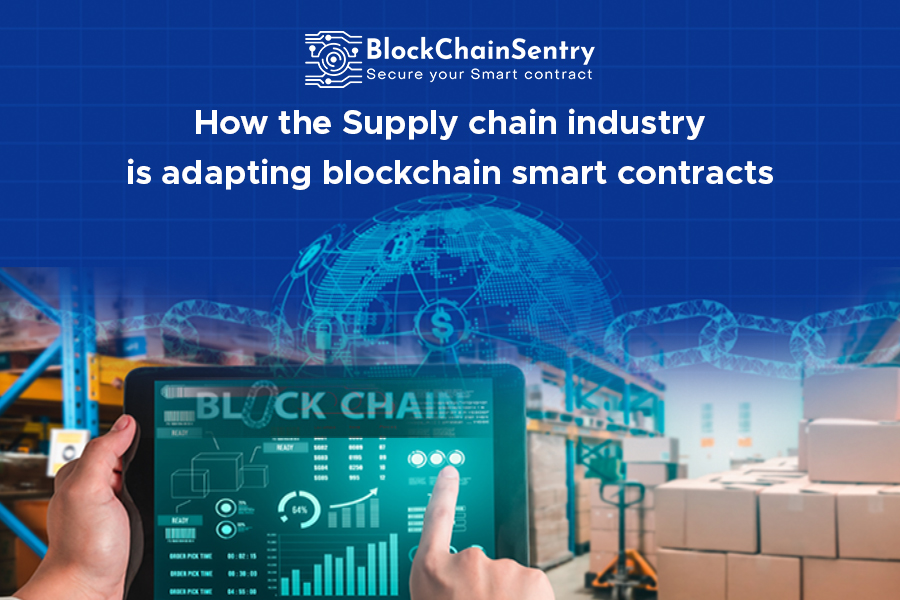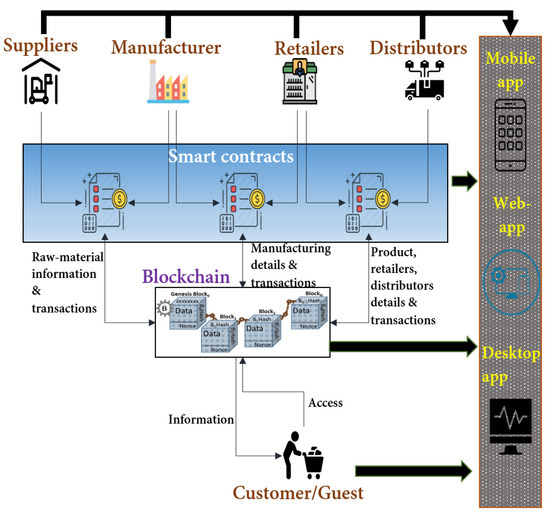How The Supply Chain Industry Is Adapting Blockchain Smart Contracts

A blockchain is a distributed ledger of transactions that revolutionizes the way records are stored, shared, and transmitted. Blockchain technology was first utilized for financial transactions and powered digital currencies like bitcoin and Ether. Now, this technology has far broader usage in blockchain applications in various industries. The implementation has been particularly noticeable in Supply Chain Management. Supply Chain Management, also known as Global Logistics, is a $1.4 trillion industry and is the world's sixth-largest (after oil and gas). The supply chain industry consists of the entire value chain, extending from raw materials to finished goods and end-users. Although it appears to be simple, there are significant challenges in the supply chain industry that add to the cost of doing business.
Major Challenges In Supply Chain Industry
The supply chain industry has faced considerable challenges in 2022, most notably, disruptions in the supply chain are expected due to pandemics, labor shortages, high transportation costs, climate change, and the impact of trade wars. These challenges in the supply chain industry have widened the demand and supply gap and made it harder for businesses to anticipate its impact. Many new product and services did not reach end-users due to lockdowns worldwide, for example, computer chip shortages, have affected the production of various products that depend on these computer chips. Many businesses have suffered shortages of raw materials and been forced to shut down shops, from restaurant food supplies to coffee shortages to the availability of lithium for electric vehicle batteries everything was affected.
Smart Contracts Of Supply Chain
A supply chain smart contract is a type of smart contract used to automate the operation of a supply chain. It aims to minimize the cost and complexity of supply chain management by automating many processes like financial disbursements, shipment of goods from one point to another, or product delivery. Supply chain smart contracts are different from standard smart contracts because they are designed to automate the entire supply chain process instead of just a single contract.
The first supply chain smart contract was developed by Intel, which they called "world's first blockchain-based supply chain contract with a time limit". Intel committed to delivering a certain quantity of product to its buyer at a particular time and price in this contract. This decentralized smart contract does not rely on a central authority for its execution and enforcement.
Efficiencies In Supply Chain Processes With Smart Contracts
In global supply chain processes, many different parties are involved, from farmers to warehousing, shipping businesses, wholesalers, and supermarkets. As there are so many parties involved, various record-keeping systems are used, from excel sheets to ERP systems, from emails to paper printouts, making this supply chain system complex and prone to errors.
Blockchain technology can assist this process by tokenizing data in a tamper-proof and self-auditable manner, allowing supply chain participants to see all transactions in real-time.
Other advantages of smart contracts for supply chain management are;
- Automating the verification and execution of numerous business transactions.
- A decentralized, immutable record also contributes to trust by ensuring that all parties access the same information.
- Smart contracts increase a supply chain's openness, traceability, and efficiency, making it more adaptive and improving stakeholder relationships.
- Substituting slow, manual processes
- Bringing down supply chain transaction costs
- Speeding up the supply chain processes
Blockchain Applications For Supply Chain Management
A blockchain-based supply chain management system is a typical supply chain application that requires blockchain infrastructure. The infrastructure includes smart contracts that ensure secure contact between parties, and a distributed ledger, which keeps all corresponding transactions and details.

Source: MDPI Open Access Journals
Potential Threats For Blockchain-Based Supply Chain Management
A blockchain-based supply chain system can contain threats to users and to the platform itself. The supply chain system, if threatened, can be hacked from the supply chain end, leading to the counterfeiting of goods, interruptions in supply chain, and possible business loss. Some of the potential threats a Blockchain-based supply chain management can encounter are discussed below.
Computational Attack
Business processes in the supply chain domain are executed by computational processes, which are used to implement interactions in a smart contract. The hackers use several methods to compromise the supply chain's functionality in a computational attack. For instance, hackers could compromise functionality by altering the smart contract and its execution or exploiting any weakness or fault in the contract or execution engine.
Communication Attack
Data or information exchange in supply chain management is managed by a communication process amongst various parties or functions of the supply chain. The hacker's goal in a communication assault is to compromise the information sent between several connected services. Here hackers could compromise information by tampering with smart contracts or other component input values, breaking communication integrity via a selective forward and drop strategy, or inserting fake information based on ledger mining of public contracts.
Sources Of Attacks
Design Of Smart Contracts
The design and development of smart contracts are a significant source of numerous vulnerabilities. Current smart contracts are limited, providing transactional capability and failing to meet the blockchain application security requirements. This is because smart contracts are created without considering the security and privacy of the applications that interface with them.
In a research paper titled "Exploring Security Practices of Smart Contract Developers," the researchers discovered that most developers do not pay attention to the security architecture of their smart contracts, putting the entire network at risk.
Blockchain Execution Environment
The blockchain execution environment is another main source of various assaults because the deployment of blockchain-based solutions involves public ledgers and contracts that are visible to anyone. As a result, attackers can quickly identify and exploit their vulnerabilities and weaknesses to launch attacks.
Security For Supply Chain Smart Contracts
Security for supply chain smart contracts and their execution environment is a complex problem. Supply chain smart contracts are a promising technology for making the trade process more efficient, reliable, and secure, but they also present many challenges, including issues related to security, privacy, and governance.
The most severe assaults on smart contracts occur when a hacker exploits a smart contract's flaws. Several technologies have recently been created to discover smart contract vulnerabilities such as,
- Re-Entrancy
- Inconsistent balance
- Transaction disorder
- Manipulating block timestamp
- Failed exception handling
- Call stack depth
- Integer overflow and underflow of numeric values, Asynchronous send operation
- No restricted write operation
- Non-validated inputs
BlockChainSentry's Vulnerability Management System(VMS) automation tool can identify all of these vulnerabilities and provide remediations to manage them. It is a scalable, BaaS application to identify vulnerabilities in Ethereum based smart contracts. It works for both public and private blockchain applications in static and dynamic environments.
Blockchain technology is gaining traction and promises to boost corporate process efficiency and innovation. Many projects are already in beta stage, and it will be interesting to see what blockchain technology can accomplish for global supply chain management.